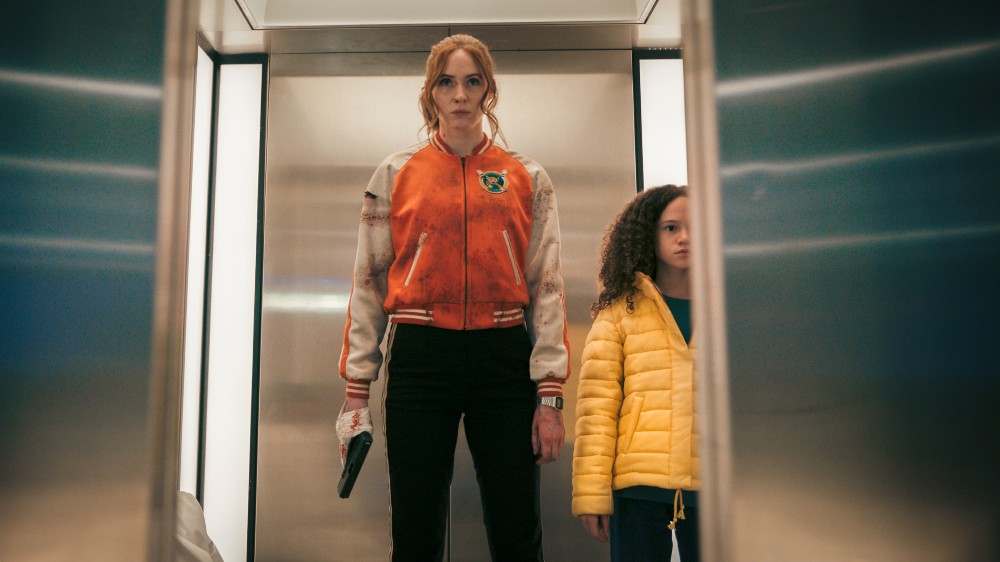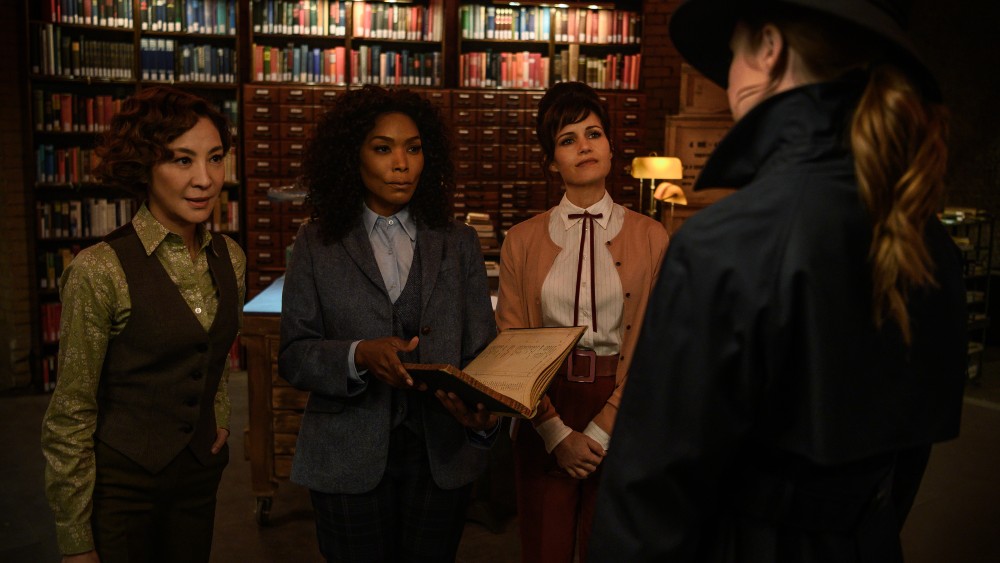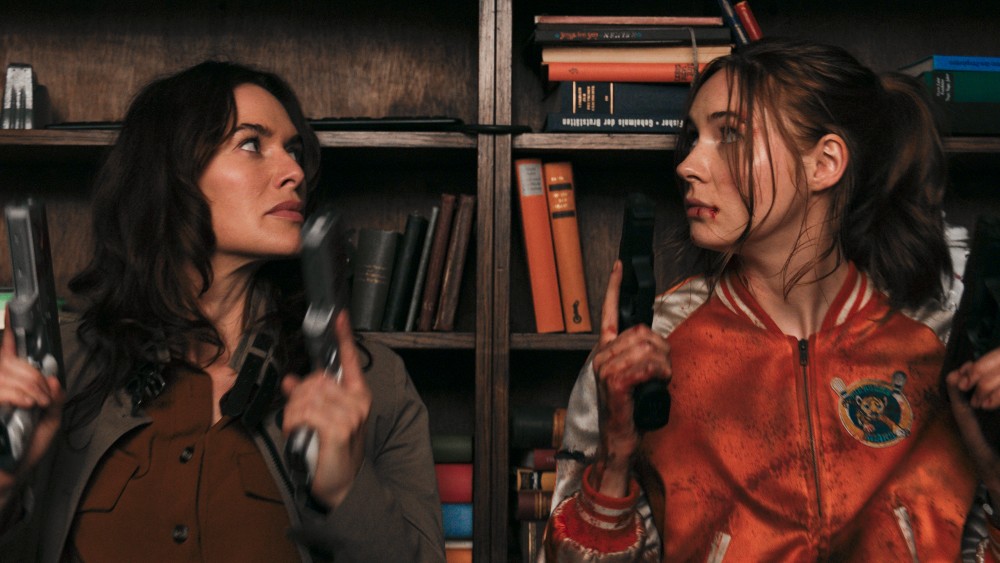
Composer Frank Ilfman teams up with filmmaker Navot Papushado for the fourth time for the Netflix genre-blender, Gunpowder Milkshake, launching on July 14. The movie stars Karen Gillan as an assassin who has to protect the 9-year-old daughter of one of her victims while teaming with her mother (Lena Headey) to fight off a group of henchmen sent to kill them.
Ilfman and Papushado previously collaborated on the films Rabies, Big Bad Wolves, and a segment in ABCs of Death 2. The score for this film sees Ilfman take inspiration from Ennio Morricone, Stelvio Cipriani, and Bernard Hermann to give the film a retro score while still making it contemporary in nature.
Growing up, Ilfman studied trombone and piano at the Jaffa Conservatorium of Music in Tel Aviv, Israel. From there, Ilfman would eventually make is way to composing for film and television. His best known scores to date include Big Bad Wolves, which won Ilfman a Saturn Award, Israeli Film Academy Award, and a special mention at the 2013 Sitges Film Festival, and Cupcakes.

Below the Line: Gunpowder Milkshake is your fourth collaboration with filmmaker Navot Papushado. At what point in the process did you become attached to the film?
Frank Ilfman: I’ve been on it fairly early because we always work together. It was always kind of like in the cards to do it. We started discussing it, I think, prior to him starting to shoot and then it kind of progressed from there.
BTL: With four films now, do you have a short-hand between each other?
Ilfman: Yeah, we kind of know how each of us works, and we always start with some sort of a playlist. We’re just kind of bouncing around different ideas, temp, and songs to see what can work where and so on. That’s usually the way we work. We’ve actually worked like this since Big Bad Wolf.
BTL: I loved how you gave Gunpowder Milkshake a retro vibe to the score, but it still has a contemporary feel.
Ilfman: That was kind of the hard part, I think, to try and get. We wanted to combine on one side, a bit of a retro feel, then you get those kinds of spaghetti western feel, then Film Noir/Bernard Herrmann-type. It’s a bit timeless—we’re not really sure what year this takes place. The idea was to try and see and combine all of those and then, I think, to each character create almost a signature tune. There’s about five or six of them throughout the film. You know when which group is which, which hero is which, so each one has a signature tune and a different style of music.

BTL: Was there a scene in the film that you really enjoyed scoring the music for?
Ilfman: I think the fun part was the one we rescored, the clinic fight. We had a normal cue playing on that, but it was just kind of like Mickey Mousing trying to hit the action. So we thought, “Okay, how can we do something that will still work with the film and give us a bit of an edge in that clinic fight?” There is something a bit funny in this whole scene. We just came up with the idea of doing a crazy flamenco mariachi band meets baroque music-type score for that one. It’s like a track that basically is like a needle drop, but actually does hit every frame where it should. We thought yeah, just do a crazy piece of music that you wouldn’t expect, for instance, to start, where especially two seconds before, you had like a big orchestral tense build up for that. That was the most fun to do, to record a mariachi band and all the players and stuff.
BTL: Were there any challenges that came because of the pandemic?
Ilfman: Yeah, a lot, actually. I scored the thing [for almost a year] because of re-cuts. We had time to experiment because of the lockdown, so everything got postponed and put on hold to some degree, except for the editing and the scoring. When it came to recording, there were a lot of players we could not record, so we had to record a lot of them remotely and then re-record as editing has changed again with the re-cuts. Those had to be done remotely, and then we were constrained a bit with some of the orchestral recording because of the amount of players you can have in a room. We had to do a longer period of recording with the orchestra. We had about a week long of recording and then the choir. Because of those restraints, we had to double up every time we did something because of the size we needed. That was a bit of a challenge throughout the pandemic to try and do it, but I think, in a way, it also helped because we had the time to experiment and decide, like with the clinic fight, “Oh, this track is great, but what if we do this? Let’s try and do something a bit more crazy and let’s see how that works.” We had time to do those, so that’s the positive point for the pandemic.
BTL: When it comes to the scoring process, do you work off of the temp music while watching the cut, or do you start from scratch with reading the script and before watching any of the film?
Ilfman: With Navot, we always play ideas and we always kind of think what music will work. If it’s something I’ve done in the past, some pop stuff, some indie rock, or some other scores that we love, and we think that could be a certain direction. With Navot, I never kind of got a script and read the script. Just because we’re friends outside of just working together, we will usually discuss the film and the ideas way before I even start working on it. We start with some ideas, and then we’ll go to one direction, and then we’ll see that it’s not really working, and then we’ll go to another direction.
I think, by now, we kind of know how things work between us, so we’ll throw loads of ideas and direction. I’ll know what to take from those and kind of direct it to where we really want to go. Sometimes, even in Gunpowder to some degree, we did a full circle, and we went back to some of our earliest ideas of trying to combine this kind of French Italian style from the 60s, this kind of lounge music from Morricone and Stelvio Cipriani and so on. It’s always a bit of research before, but we’re just kind of bouncing playlist ideas between us to get to them.

BTL: Is there a genre that you love to score more than others?
Ilfman: No, not really. I mean, I think I’ve done almost most genres that I could. Each one is always a challenge. I think the fun is that you have the directors that challenge you. With Gunpowder, you’ve got a few genres within—it’s like a genre-blender. That’s quite challenging to try and do several things yet to kind of keep one entity and have it as one character within the movie. The Etruscan Smile was great to try and do—this kind of heartfelt drama, which I haven’t done many, because I’ve done a lot of horrors and psychological thrillers, so that was quite fun to do.
BTL: How did you first develop an interest in becoming a film composer?
Ilfman: I think it just kind of more happened to me through the years. I’ve studied trombone and piano, and then I’ve just been in rock bands and working in studios. It was never kind of on my mind to try and be a film composer. I’ve done some programming for Jan Hammer, and then it’s kind of progressed from there to do music for kind of theater and things like that. It just kind of drifted into film. I think it’s the most joyful medium I’ve enjoyed to do, so that’s my main thing. I still do the odd stuff with the rock band that I used to be in and other things. But yeah, it’s it just kind of flew into that.
BTL: What advice would you give to someone wanting to go into film composing?
Ilfman: I would say be as dedicated as you can, because it takes a lot of years to get to where you want to get. There’s always the off-ones but usually, you need a lot of dedication and effort. The other thing is just be as true and original to yourself as you can be—just try and develop a voice which will actually make you a bit more unique than others that are in the field. I think if you do have a voice and dedication—with time, it will just happen.
Gunpowder Milkshake is now streaming on Netflix.
All photos courtesy Studiocanal; photographer: Reiner Bajo (except where noted otherwise).





